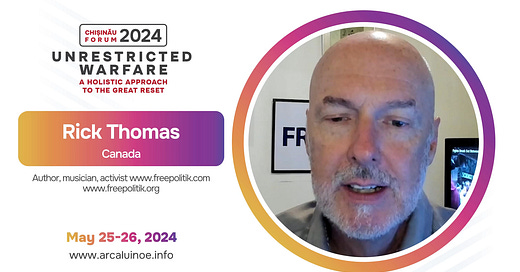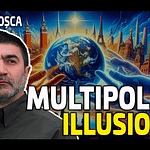Good afternoon, Chisinau Forum. Greetings from Vancouver Canada, my name is Rick Thomas, and I would like to thank Yuri Rosca for inviting me to participate in this forum. We would have liked to attend in person, but it didn't work out this year with our other commitments but hey, maybe next year. It would be great to visit Moldova.
In keeping with the topic of the Forum “Unrestricted Warfare: A Holistic Approach to the Great Reset,” an intriguing, provocative topic, it made me reflect on strategies. We are in a war, a very different hybrid, full spectrum dominance kind of war, where we have a multitude of challenges facing us. Many people are looking for a silver bullet solution, but I believe what we really need is a machine gun of solutions, a collective effort. There are just way too many challenges for any one person, or even a group of people, to work on, as we are being hit on all sides. So, it needs to be collective, everybody working together on an international scale. This must be an unprecedented social movement, definitely a challenge.
Top Ten Successful Strategies for Social Movements
In keeping with that, my approach to this comes from how I got involved in the movement, which was through hosting and organizing rallies and events here in Vancouver at the Art Gallery. I spent a lot of time in the last four years studying, reading and researching previous social movements to see how they did things ― what they did right what they did wrong ― what makes social movements successful and what makes them unsuccessful. So, I've come up with the Top 10 most important things that help any kind of social movement.
Strong leadership
Clear goals and demands
Simple message and slogans
Gain public sympathy
Connect to political activists within established parties
Prolonged occupation of government buildings or centers of power
Enlist labour unions
Gain the support and sympathy of the police and military
Peaceful non-violent
Instilling fear in the hearts of politicians and power brokers
1. Strong leadership: You have to have a strong group who are committed, stable people. One particular group was the Occupy Wall Street movement, which incidentally was started here in Vancouver by Adbusters magazine. They claimed that they were a “leaderless Revolution,” which was not true, really. Those who were proclaiming it was a “leaderless revolution” were the leaders.
2. Clear goals and demands: The revolution, the movement has to have a stated, agreed-upon list of things they’re trying to accomplish, and the demands they are making on the establishment. All social movements without exception are political dissidents’ challenges and fights with the establishment. So, the establishment and those who are wondering whether your movement is really legitimate need to know what you want.
3. Simple messages and slogans, and I can give you a couple examples of previous social movements such as Black Lives Matter ― that was really their slogan Black Lives Matter. It was very simple, it could be easily repeated, everybody knew what it meant.
Another was the Truckers Convoy here in Canada. The Canadian flag became the symbol of our struggle.
Another example from history, is the Russian Revolution in 1917. The first revolution, in late February March, their slogan was bread, land, peace. So that's very important that your messaging is simple.
The Palestinian protesters now have very good messaging, they have the watermelon symbol. The Palestinian flag is also a symbol. From The River to The Sea, Palestine will be free ― all of these things make it easy for people to understand, come together, and everybody knows what you're talking about. It becomes the archetypal symbol of the movement.
4. It's very important to gain public sympathy. During Covid, we did not gain public sympathy. In fact, the general public were completely against us. 5.7 billion people took the mRNA injections and we were vilified, made out to be political and social lepers, and it was not something that happened.
5. Connect to political activists within established parties. Now there is a distinction that needs to be made between political activists and politicians themselves, because most politicians are not activists, they are there to protect the platform, of not only their party, but the establishment. Very few of them are actually activists. A couple come to mind, Christine Anderson in the EU. Here in Canada, we have Randy Hillier and Max Bernier, who are actual political activists working within established parties and they were marginalized by their own parties. Both of them had big struggles with their conservative parties here in Canada.
6. Prolonged occupation of government buildings and centers of power. There are many examples of this. In the anti-Vietnam, anti-war protests of the 1960s, protesters occupied many different buildings, senators’ offices, and public spaces. Coincidentally, 56 years ago on May 1st 1968, Hamilton Hall in Columbia University was occupied by the students, protesting segregation and the Vietnam War, and they took over Hamilton Hall and 56 years later to the date, the Palestinian students at Columbia University did the exact same thing with the same results, as the NYPD were brought in, cracked down, arrested a lot of them and shut it down.
7. Enlist labour unions. This is very important because labour unions represent the working class which is the broad base of any nation, and we again during COVID, we did not gain the support of labour unions ― they were against us. Here in Vancouver, a group of the labour union leaders wrote a long letter speaking out against us protesting, claiming we were misogynous, sexist, racist, homophobic bigots.
8. It's important to gain the support and sympathy of the police and the military. This has been a fundamental aspect of any social revolution, that once the police and the military are on your side, the Establishment has no way to shut you down. They can’t bring in the Goon Squad if the Goon squads takes your side. Here in Vancouver, the RCMP, that’s the federal police, were definitely not on our side. Locally, here in Vancouver, we did gain the support of the Vancouver Police Department who said from the beginning, the chief of police came out publicly and said he would not interfere with our right for freedom of speech. We were the exception here in Vancouver, and we never got any fines or arrests, you know, as long as we stayed peaceful everything was fine.
9. The revolution, the movement must be peaceful and nonviolent. There have been studies done of social movements and active rebellions over the last 100 years and peaceful nonviolent revolutions are twice as effective as violent ones. Studies have shown that violent revolutions have about a 25% success rate compared to peaceful, nonviolent revolutions which have about a 50% success rate, so 50-50. Those are our odds. That's not too bad, considering the challenges we're facing, and in my opinion, we eventually will triumph over all of this looming, impending global tyranny. It just is going to take some time and organization.
10. Instilling fear in the hearts of politicians and power brokers. This is very important, that everything you are doing scares the Establishment. The thing that they are most afraid of is losing their position and power. They're afraid. Politicians are afraid of being exposed as corrupt, losing their six figure incomes and many of them have much bigger incomes than that. Losing their status in society and going back to being poor working-class, this is a horrifying thought for them, and that needs to be put in their hearts ― to understand that our revolution, our movement’s main goal is to overthrow them and put better stewards in their place.
Wait For the Trigger Event
Having said all that, the whole point of civil, social protest and revolution is to wait for the trigger event. It's not our job, as individuals or groups to blow things up. It's only our responsibility to do what each of us can do individually. Every single action that you take, whether it's speaking out publicly, attending a protest, emailing your Member of Parliament or your senator, governor, writing an article, writing a book ― all of these things are logs on the fire. We're just trying to build a bonfire and let the trigger event occur. And it will eventually, because eventually the power brokers, the Establishment, they will overplay their hand and make a mistake, and go too far, and this will light the bonfire.
This happened here in Canada with the Truckers Convoy, and that was triggered by Justin Trudeau, with our prime minister, who made it mandatory for truckers crossing the US and Canadian borders, back and forth, to have a vaccine. The Truckers Convoy would not have happened without the two years of protests before that, without us standing out there and building support, and then the truckers ran with it, literally drove all the way to Ottawa and became the focal point of the whole international movement.
Most of these social movements, in and of themselves, do not immediately ― at least, not always ― but most, do not immediately provoke change. But what they do is lay the foundation for further things. Like for example, the Occupy Wall Street movement did not change things with corporate greed, but they laid the foundation.
The Palestinian Occupy Movement which is based on the Occupy Wall Street movement where they have 140 universities, here in North America alone, occupied by camps and this was all mirrored after Occupy Wall Street camps. So, these movements build on each other and they copy each other. That is very important for all of us.
Secular Materialism
The last point that I would like to make, is that what has to happen, for our revolution on a global level to succeed, is based on the problem itself. How did we get in this mess, and in my humble opinion, we are in this mess collectively as a world, and not just as individual nations or societies. But it's a global problem that started, it was initiated in the West, in Europe ― specifically during the 1700s. The Secular Revolt, the Enlightenment thinkers rebelled against the monarchy and the Church. They didn't like that the totalitarian Church was in bed with the State, which was the monarchy. They wanted civil rights and freedoms and this triggered many different social phenomena.
The Secular Revolt against the state, with separation of church and state, happened ― people started getting constitutions with Charters of Rights. First in the United States and then France, the Rights of Man. Everyone in the world now, almost all countries want to have a Charter of Rights and Freedoms, which is good.
Also good, the Scientific Revolution mushroomed out of all this, this rebellion against the Church and the State, and we have you know marvellous technology now. We wouldn't be able to have this event if we didn't have this amazing technology to talk to each other online. Here I am sitting in front of my computer recording this. This was unheard of 50 years ago, people didn't have their own recording studios in their own homes.
The other thing that happened was the beginning of modern militant atheism, materialism, secularism and humanism. All of these things have permeated our entire globe, not just the West. Societies all over the world have adopted this secular materialist philosophy which is very subtle and it's the absence of spirituality, religion and God within the political arena. There's no discussion anymore in societies, within political parties, in governments. Leaders don't get up there and talk about their spiritual and religious point of view.
If you go to nations that we call old school, or Old-World thinking, like specifically Muslim nations, everybody talks about God, about Allah. They pray five times a day it's part of their culture, everyone has a religious point of view. Whether you agree with it or not, any religious point of view is better than none.
Atheism is nihilism. It's based on this scientific belief, or actually, it's a non-scientific belief, that the universe self-created itself, out of nothing, for no reason, by accident. This is magical thinking, and it's the root problem. It's the philosophy of our age.
Spiritualize the Revolution
In order to combat that, it needs to be reverse-engineered, and the revolution needs to be spiritualized in my humble opinion. It needs to become part of our dialogue, our rallies, our protests, our conversations with the mainstream media, the articles we write, the books we write. Everything needs to be spiritualized, injected with universal values, as broad as possible to cover the broad base of humanity.
You know we have four major world religions: Christianity, Islam, Buddhism, Hinduism and eight minor world religions, and all these religions of course, they have different ideologies so, the idea is not, we're not here to Christianize or Islamify people.
These universal values are the basis of all religions. Things like the Golden Rule. All these common values need to be promoted again, and reintroduced into our society on a global level, and to me this is the path forward. It’s not a silver bullet solution, it's a path forward, and I believe that will change the way that people look at the political dissidents. We're not just out there with our political banners rooting for whatever political ideology or political party. We're there to root for all of humanity, because that is what is at stake fundamentally, is the survival, the future of humanity.
It has been laid upon the shoulders of this international Freedom Movement, alternative community, the truther community, this struggle for medical rights which happened under four years of COVID. It's not just medical rights, but that was what they used to undermine all civil rights. We are a human rights movement, in my humble opinion, a spiritual Human Rights Movement.
I think I've gone over my time but thanks again very much Yuri and the Chisinau Forum. Many of the participants, I have been reading their articles and books for several years now so I'm honoured to be part of this group. Thank you very much from Canada, and God bless you.
Peace on Earth, thank you very much.












Share this post